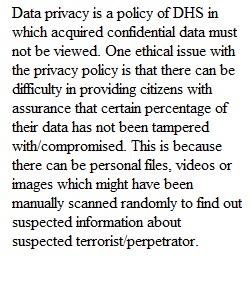


Q Ethical Issues in Homeland Security There are no overarching ethical standards or principles for homeland security despite the complex mix of ethical issues that arise in each of the homeland security mission areas. For example, to prevent terrorism, the government must consider the need for secrecy and confidentiality versus the need to share information among agencies or the public's right to know. There also are ethical issues related to racial or ethnic profiling, awarding no-bid contracts in disaster relief or homeland security research and development projects, and proper treatment of suspects and persons detained as terrorists. However, as the homeland security system and the Department of Homeland Security are still relatively new in terms of government bureaucracy, ethical codes or standards have only gradually been applied in a piecemeal, incremental fashion. Therefore, until such time as a clear, comprehensive, and ethical code for homeland security emerges, it is important to understand the theoretical or philosophical models about the obligations and limitations of government to draw conclusions about the ethical implications, in practical terms, for a variety of homeland security scenarios and issues. To prepare for this Discussion: • • Review the online article, "Philosophy and Disaster." Reflect on the application of social contract theory and moral theory to the government's role in disasters, and the quest for social justice. With the theoretical analysis in mind, consider ethical issues related to homeland security policies and practices. • • Review the article, "Guiding Lights: Intelligence Oversight and Control for the Challenge of Terrorism." Focus on ethical issues related to data mining and monitoring political activity and consider how they might be addressed. • • Reflect on the homeland security policies and practices you learned about thus far in the course. Consider ethical issues that might arise in the policies and practices and think about how you might address such issues. • • Select a homeland security policy or practice in which there are ethical issues concerning the policy or practice itself or how it is executed. • • Identify at least two ethical issues related to the policy or practice you selected. • • Think about how you would address the ethical issues you identified. With these thoughts in mind: Post by Day 3 a brief description of the homeland security policy or practice you selected and explain how it is executed. Then, explain at least two ethical issues related to the policy or practice. Finally, explain how you might address each ethical issue. Be specific. Note: Include the policy or practice you selected in the first line of your post. You will be asked to respond to a colleague who chose a different policy or practice than the one you discussed. Be sure to support your postings and responses with specific references to the Learning Resources . Read a selection of your colleagues' postings. Respond by Day 5 to at least one of your colleagues' postings. Be sure to respond to a colleague who chose a different policy. Respond in one or more of the following ways: • Ask a probing question. • Share an insight from having read your colleague's posting. • Offer and support an opinion. • Validate an idea with your own experience. • Make a suggestion. • Expand on your colleague's posting. Return to this Discussion in a few days to read the responses to your initial posting. Note what you have learned and/or any insights you have gained as a result of the comments your colleagues made.
View Related Questions